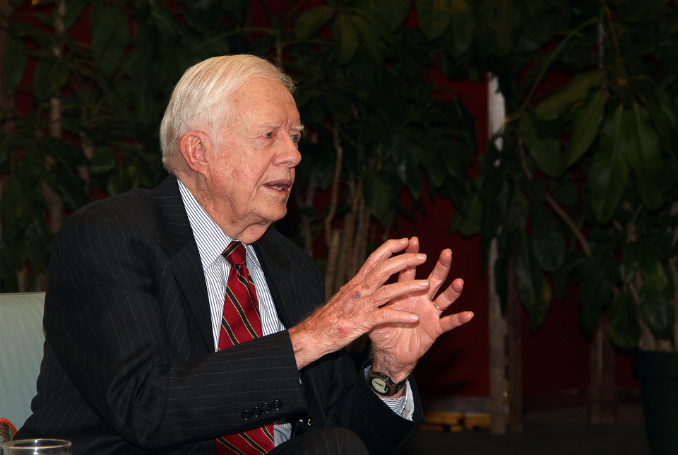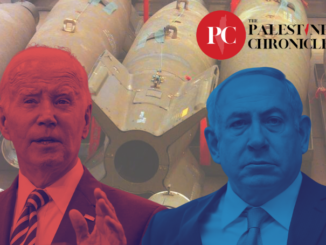
Former US President Jimmy Carter, the longest-lived president in American history, has died at the age of 100, the Carter Centre announced on Monday.
While his son, Chip Carter, called him “a hero, not only to me but to everyone who believes in peace, human rights, and unselfish love,” his politics, especially on occupied Palestine and Israel, was not necessarily loved by all.
During his tenure as president, Carter facilitated the signing of the Camp David Accords between Egypt and Israel in 1978 after 12 days of negotiations.
The agreement led to the first peace treaty between Israel and any of its Arab neighbors and ended the conflict between the two countries that had existed since the establishment of Israel on the ruins of historic Palestine in 1948.
Our founder, former U.S. President Jimmy Carter, passed away this afternoon in Plains, Georgia. pic.twitter.com/aqYmcE9tXi
— The Carter Center (@CarterCenter) December 29, 2024
The treaty included Israel agreeing to withdraw from the Sinai Peninsula, which it had occupied since the Six-Day War in 1967 as well as normalized relations, including diplomatic, economic and cultural ties, between the two countries.
As a result, Egyptian President Anwar Sadat and Israeli Prime Minister Menachem Begin were awarded the 1978 Nobel Peace Prize. Carter would be awarded the same in 2002 “for his decades of untiring effort to find peaceful solutions to international conflicts, to advance democracy and human rights, and to promote economic and social development.”
‘Palestine: Peace Not Apartheid’
After he left office, having served from 1977 to 1981, Carter became more critical of Israel’s policies and in 2006 authored ‘Palestine: Peace Not Apartheid’ in which he described the Israeli occupation of Palestinian territories as akin to apartheid in South Africa.
The publication raised the ire of prominent American supporters of Israel with Deborah Lipstadt, who is the current US administration’s special envoy against antisemitism, accusing him of having a “Jewish problem,” according to The Guardian newspaper.
Former U.S. President Jimmy Carter faced backlash two decades ago after labeling Israel's treatment of Palestinians "apartheid," a finding now echoed by many human rights groups. Carter explained his then-controversial position in a 2007 interview with Democracy Now! pic.twitter.com/0CMdKW8kc7
— Democracy Now! (@democracynow) December 30, 2024
The paper said pro-Israel lobby groups also placed adverts in the New York Times accusing Carter of “facilitating those who ‘pursue Israel’s annihilation.’”
In an interview with Democracy Now in 2007, Carter defended his view saying “The word apartheid is exactly accurate…much worse than they were in South Africa by the way.”
“This is an area that’s occupied by two powers,” he explained. “They’re now completely separated. Palestinians can’t even ride on the same roads that Israelis have created or built in Palestinian territory. “
He added: “Another definition of apartheid is one side dominates the other, and the israelis completely dominate the life of the Palestinian people.”
October 7 Statement
Carter’s foundation released a statement after the October 7, 2023 war, calling for a ceasefire and urging Israel to “enable essential services to reach Gaza so lives can be saved.”
At the time, the death toll in Gaza was more than 8,000 people, including 3,000 children, according to the statement. Since then, the death toll in Gaza has exceeded 45,000, with over 108,000 injured and over 11,000 still missing.
A Palestinian Year in Review: Genocide, Resistance and Unanswered Questions
“Israel, like all nations, has a right to defend itself; it also has the obligation of proportionality under international law. Violence will only beget more violence,” the statement said.
“There is no military solution to this crisis, only a political one that acknowledges the common humanity of both Israelis and Palestinians, respects the human rights of all, and creates a path for both societies to live side by side in peace,” it added.
Chomsky on Carter
But Carter, who served as the 39th US president, will also be remembered for his role in other conflicts around the world.
The Carter administration provided huge military support to Indonesia as it slaughtered “maybe a quarter of the population” in East Timor, according to renowned political analyst, Noam Chomsky.
although Jimmy Carter was unique among former US Presidents for taking a principled stance against the genocidal Israeli Apartheid regime, while he was in office he too was a war criminal Zionist fanatic like the rest of them. The media class will erase both parts of his record pic.twitter.com/rOtT9Wt5nM
— ☀️? (@zei_squirrel) December 30, 2024
“As the Indonesian atrocities were increasing – they peaked in 1978 – Carter’s flow of weapons to Indonesia increased,” Chomsky said in an interview.
He explained that when the US Congress imposed “human rights restrictions” to block the flow of advanced weaponry to Indonesia, “Carter arranged through Mondale, the vice-president, to get Israel to send US Skyhawks to Indonesia to enable Indonesia to complete what turned out to be near genocide, killing maybe a quarter of the population or something.”
Chomsky said in the same interview that after the signing of the Camp David Accords, “Carter raised military and other aid to Israel to more than 50 percent of total aid worldwide.”
He added that Israel “used it at once in exactly the way they said they were going to do…as an opportunity to attack their northern neighbor, first in 1978 then in 1982, and to increase integration of the occupied territories.”
Other World Conflicts
According to a Counterpunch report, Carter claimed that the US “had no obligation to help Vietnam after the war because the ‘destruction was mutual’ and “continued to assault the new socialist government in Hanoi, blocking its attempts to get promised reparations from the U.S. or aid from international agencies like the IMF or World Bank.”
The report further delves into Carter’s policies on other global conflicts, including Nicaragua and the Contra War, Afghanistan and the Mujahideen, and Angola’s war of national liberation.
Carter’s administration was also marred by economic turbulence, including high inflation, gasoline shortages, and the Iran hostage crisis, Al Mayadeen reported.
“The botched rescue effort that ended with the death of eight Americans in 1980 was a humiliating point, contributing to his massive defeat to Ronald Reagan,” reported the channel.
Carter, who served in the US Navy’s submarine division, will have a submarine named in his honor.
(The Palestine Chronicle)









Be the first to comment